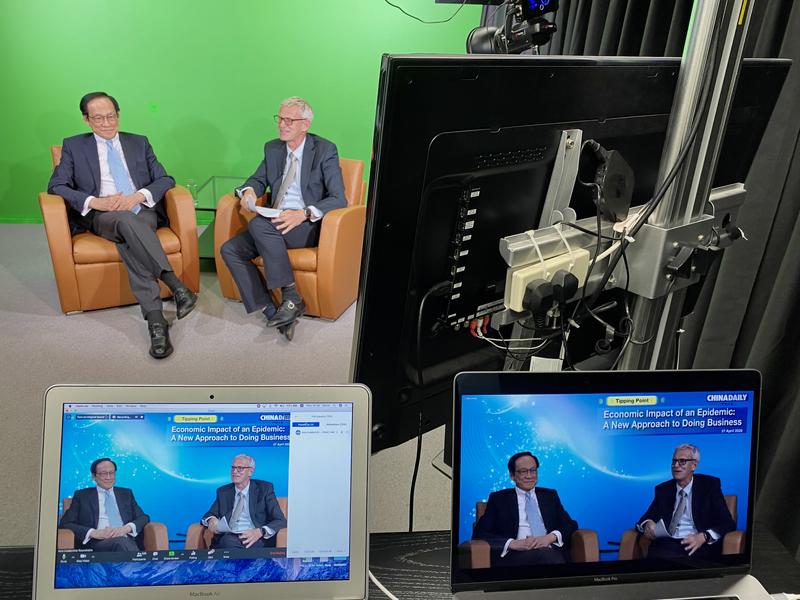 Guest speakers share their views on post-pandemic challenges at a webinar themed “Tipping Point: Economic Impact of an Epidemic: A New Approach to Doing Business”, held in Hong Kong on Monday. (EDMOND TANG / CHINA DAILY)
Guest speakers share their views on post-pandemic challenges at a webinar themed “Tipping Point: Economic Impact of an Epidemic: A New Approach to Doing Business”, held in Hong Kong on Monday. (EDMOND TANG / CHINA DAILY)
As the coronavirus-hit global economy charts the course of restarting in the aftermath of the unprecedented public-health crisis, businesses and the international community should lose no time in gearing themselves up for the pronounced, wide-ranging technological and societal changes that can fundamentally reshape our future, industry leaders and experts told the China Daily Asia Leadership Roundtable in Hong Kong on Monday.
Speaking at the webinar panel titled “Tipping Point: Economic Impact of an Epidemic: A New Approach to Doing Business”, Edward Chen Kwan-yiu, chairman of HKU School of Professional and Continuing Education, said every economic shock leaves a legacy, and the coronavirus will be no different. The world will be bracing for a “grand recession”.
With all these disturbances and disruptions, there must be a rearrangement of the global supply chain. Some industries may be brought home, while some countries will try to diversify their sources of supply. You’ll see a new scenario of geo-economics in the post-pandemic era
Edward Chen Kwan-yiu, chairman of HKU School of Professional and Continuing Education
“Compared with the last Great Recession caused by the 2008 global financial crisis, what makes the recession this time so ‘grand’ is not just in terms of how many jobs we’re going to lose, but results from the fact that we’re going to be led to a historical turning point in terms of geo-economics,” he warned.
Well before the pandemic, there had been a lot of talk about the “deglobalization trend” that may find its roots in the “America First” policy and the United Kingdom’s withdrawal from the European Union, Chen noted.
“Nowadays, the deglobalization trend has been sped up by the pandemic, with the breakdown of the global supply chain not only at the national level, but at the international level,” he reckoned, adding that up to 75 percent of world trade is related to the supply chain, and China alone accounts for half of it.
“With all these disturbances and disruptions, there must be a rearrangement of the global supply chain. Some industries may be brought home, while some countries will try to diversify their sources of supply. You’ll see a new scenario of geo-economics in the post-pandemic era.”
However, Chen stressed he’s not fully pessimistic. He prefers to use the word “reglobalization” rather than “deglobalization” to depict the sea change poised to take place.
To be sure, some companies are standing at the frontier to get a taste of the upcoming changes.
Norma Chu, founder and chief executive officer of DayDayCook — a Hong Kong-based operator of an online cooking-recipes-sharing platform — said traffic in her company’s cooking videos saw a whopping 200 to 300 percent growth in February and March, as more people stayed at home, rekindling their interest in cooking.
“With the emergence of the ‘stay-at-home economy’, the challenge for DayDayCook and its kind at this moment is how we can bring everyone back from a complete standstill to work safely, in order to capture the explosive growth in demand,” she said.
As an entrepreneur, Chu said she has to believe “we’re going to come out of the crisis stronger”, hoping for a recovery in the second half of next year. “We’re going to be more efficient, nimbler and more resilient as a society, as a whole.”
Tony Tsang, chief executive officer of DYXnet Group, an authorized reseller of Zoom, believes that people’s behavior, as well as the way corporations conduct their businesses, may be forever changed because of the pandemic.
In 2003, when the SARS epidemic erupted, Tsang recalled he was among the first batch of people to push for working online. Compared with SARS, the coronavirus pandemic has lasted much longer, the virus has spread wider and has left a greater impact on human society.
“Human behavior is like this — if you do something only one or two times, it may not have much of an effect. But if you do it for months, you’ll build up your staff and you use them intensively, then you see the value of it. This will become something not easy to give up,” he explained.
Joe Ngai, senior partner and managing partner of McKinsey, Greater China, called the drastic measures the world has taken to combat the pandemic as “chemotherapy to cancer patients”.
“We are killing the virus. True enough. But we are also killing a lot of things along with it,” Ngai said, adding that what concerns him most is that the “weak and vulnerable” businesses won’t be able to survive the pandemic, which will make the thorny issue of inequality even worse.
He foresees the digital population becoming even stronger after the pandemic.
“People who are younger, better educated and more capable of leveraging these changes and technological tools will certainly become more powerful, whereas people who have no choice but to make a living through manual labor and physical effort are likely to be more marginalized in business,” Ngai emphasized.
“It’s just like people with low income are usually the first ones to be laid off and in dire need of more government help.”


